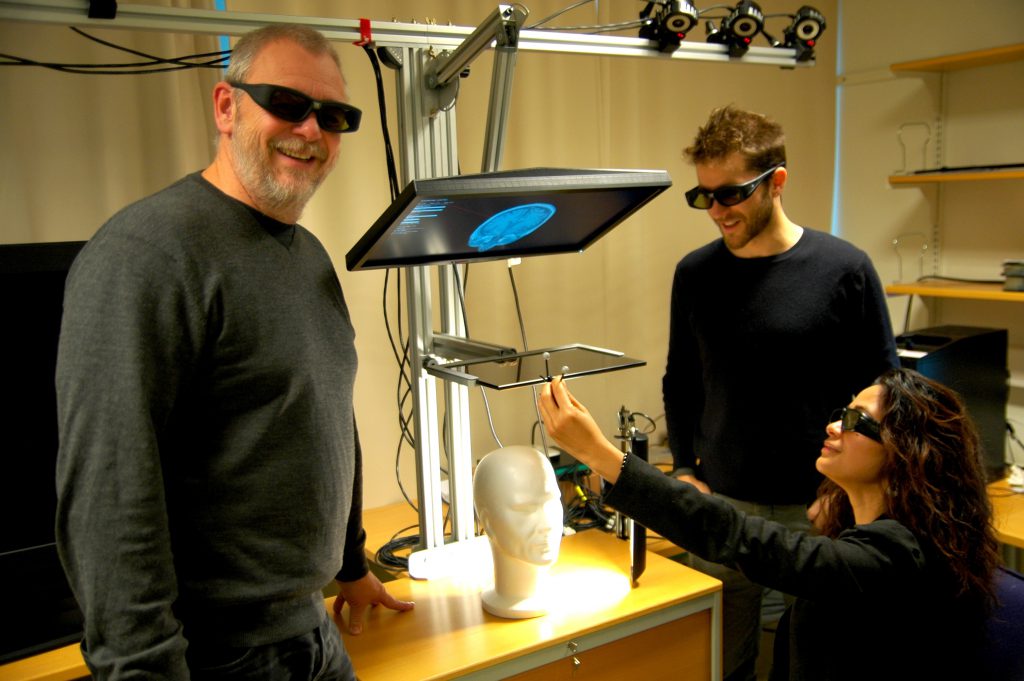About QoE
At NTNU we have a long experience in assessing the quality of Media Technology systems. We were one of the early adopters of quality modelling and assessment using the notion of ‘Quality of Experience’ (QoE) and also a major influencer on its development through numerous PhDs and research projects. The concept gained momentum in different application contexts in the 90’s, and it is currently widely spread amongst the media technology stakeholders. QoE is relevant for those aiming at the improvement of the quality of a system which comprehends multiple media formats over complex telecommunication systems. The term QoE and the assessment methodologies defined around it help a broad community to work towards a better understanding of the overall perceived quality of a system. We apply our knowledge and the acquired methodologies to assess the quality of Immersive Media Technologies.
The Sense-IT research team at NTNU
Our current research focus at Sense-IT is on QoE modelling and assessment for Media Technology Experiences (IMTE). This is a key concept incorporating several disciplines including Media Technology, Information and Communication Technology, and Media Studies. In this way IMTE can encompass diverse core competencies covering fields such as communications, information retrieval, entertainment and social networks. The scientific platform of Immersive Media Technology Experiences makes use of today’s new digital media and merges these into social networks by connecting people in a whole new way creating collaboration spaces. A strong emphasis on experiences achieves full focus on the users and their requirements and needs, enabled by the developed experience model describing the complete media technology eco system from content representations to its usages and social, economic and cultural impact.
Sense-IT is contributing on the set up of QoE evaluations in AdMire
The SenseIT Multimedia Lab is formed by a core team and a flowing research talent coming form different backgrounds like engineering, design, science or architecture and we all share ideas and projects to grasp a better understanding of this broad field of research. The focus of our research will be to ensure that multiuser interactions considering the real-time streaming of audio and video are fully understood and that these are mapped against the possibilities offered by the AdMiRe technology. The key tasks are:
– Create a process by which the end users can be consulted on the requirements for use of the AdMiRe technology.
– Requirement extraction by conducting in-depth interviews and other data collection mechanisms.
– Definition of a procedure for the validation of the QoE in AdMiRe.
– Validation of the AdMire technical and functional specifications of the system.
– Modelling and assessment of the Quality of Experience (QoE) of the AdMire system.
The importance of QoE to the End Users
The user needs will guide to which QoE parameters should be evaluated. In preparation for this, work groups will be held with broadcasters to define them. In our evaluations we will use subjective assessment to assess the QoE of the system. We will be surveying users to describe the perceived qualities of several different features such as:
– Realism of the inserted silhouette.
– The effects of the dynamic range and colour gamut.
– The impact that errors cause in the content due to lighting, acoustic reverberation, noise, camera point of view, etc…
– The sense of being there as perceived by the user in terms of the user’s perception of immersion and presence.
These influencing factors will help us define the best expected quality of the system and the main features to take into account in order to design the system for the best results.
Caption: Jordi Puig demonstrating his experimental setup for assessing QoE of early AR applications during his PhD studies in 2015.



